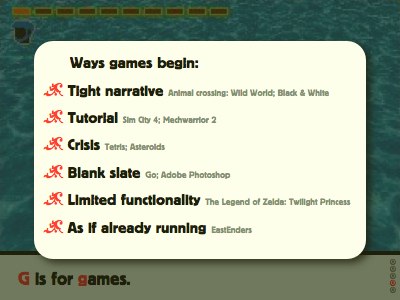The Experience Stack
This is the list we came up with, and I thought I’d share it today, just so i could have something for “g”:
- Tight narrative. In Animal Crossing: Wild World for the Nintendo DS, you have to sit in the back of a cab and have a conversation with a fox or a bear or something. There are no other options. In Black & White you have to follow some villagers.
- Tutorial. Sim City 4 and Mechwarrior 2 both have an explicit education stage.
- Crisis games like Tetris and Asteroids drop you right into the action, and if you don’t do anything you die immediately and have to start again.
- Blank slate—both Go (the board game) and Adobe Photoshop give you an invert canvas with nothing happening to start
- Limited functionality. At the beginning of The Legend of Zelda: Twilight Princess, you don’t have weapons or a horse. Those get introduced gradually.
- As if already running. EastEnders and other soap operas are like this, making no concessions to new viewers.
This last one is a problem for me. The first three force you to make a move, and then you’re up and running running. The crisis is good in some cases, especially for repeated games. And the fifth is an acknowledgement of how players learn in general.
But the last is an abdication of responsibility to help the user get started. Sometimes it doesn’t matter—I join up at a lot of websites at the same time as my friends, so we learn together. And since developers gradually add features and I join while the website itself is very simple, my experience ends up mimicking the “start with limited functionality” model.
But goodness, for almost every website I use I wish they’d choose one of the first five models. It would be a terrible experience to join up to Amazon now, in their ‘as if already running’ model, without having experienced their growing complexity of the last few years.
But who am I to be saying any of this?
